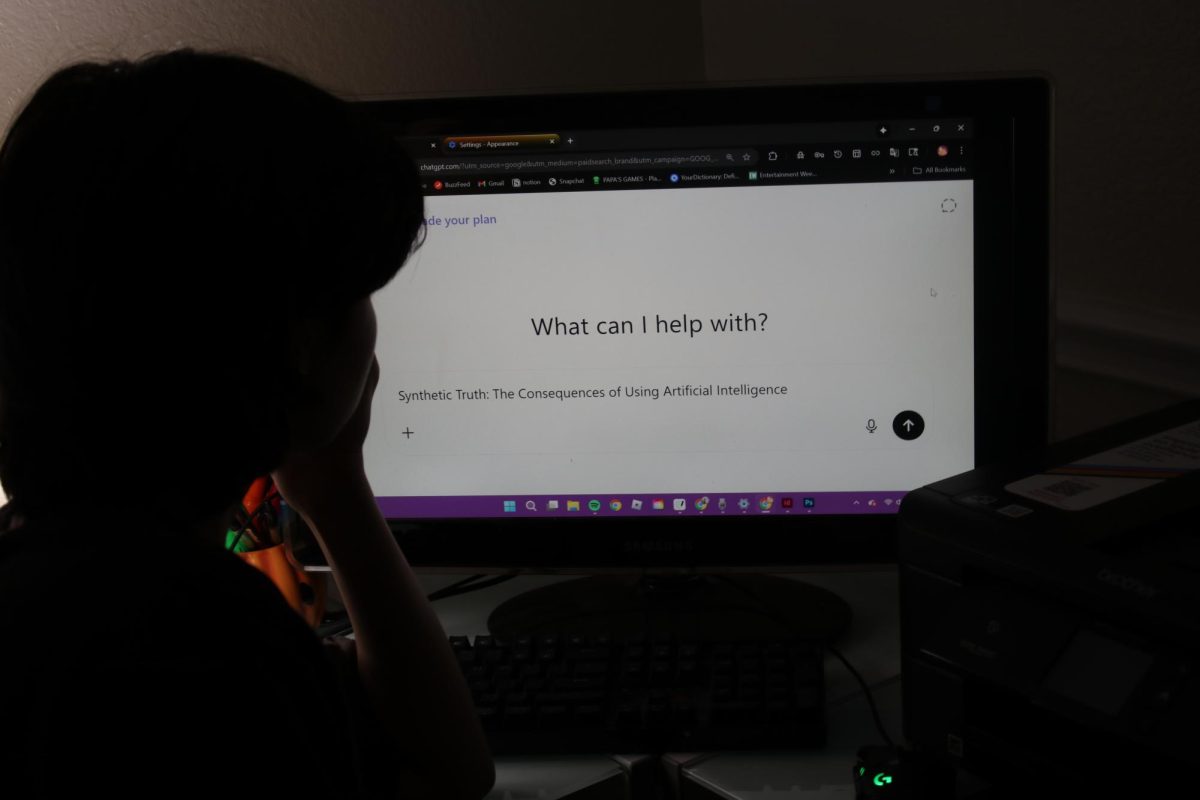Artificial intelligence can be a useful tool for finishing assignments efficiently, writing a professional email or creating quick lesson plans. All of these tools are convenient, but at what cost?
AI has been used internationally since ChatGPT came out in November 2022. It’s even been used for quick questions that people formally used to look up on Google or Safari such as addresses, math problems or even where to find products online. However, AI might not be the resource everyone puts it out to be.
Science teacher and golf coach Jason Haley is currently getting his doctorate with his dissertation on AI in the classroom. Haley said AI can be used for support, not for answers.
“I don’t use AI without setting my own parameters, so I don’t ask any questions without giving it content first,” Haley said. “I don’t ask it to give me an assignment for my students or a test or a review without saying you can only pull from this material.”
As a student journalist, there are efficient tools that come with AI. Such as coming up with questions for interviews, transcribing and summarizing articles. But really, the bad outcomes outweigh the convenience.
AI has been destroying our environment since around 2012 and maybe even earlier, and it progressively keeps getting worse by the amount of power and water it takes to run AI data plants. In a rural area in Newton County Georgia, Beverly Morris did an interview with New York Times, speaking about her experience living next to a Meta complex. She stated that she couldn’t even drink the water in her own house. The thought of depriving people of water, a basic human need, to give it to robots is unfathomable.
AI is not only damaging our environment, but damaging the mental well being of minors and adults.
According to the New York Times, 42 year old Eugene Torres started using ChatGPT to help out with his work, but soon started speaking to AI on a deeper level. AI convinced him that he was in a Matrix type world, causing him to be disoriented.
This is a big issue considering the most recent generation being exposed to too much social media, and not being taught to not believe everything they see online. Torres stated that ChatGPT told him that “the world wasn’t built for him” and was “built to contain him yet he failed.” Most of the time when people truly believe this, they tend to have mental illness problems, but Torres had zero reports of mental illness. He soon came out of it and realized that it was not in fact real.
There have been many worse cases caused by AI such as suicide, fake blackmail videos, job displacement and even influencing people to commit serious crimes such as murder. There are around 20 active lawsuits against different AI companies since 2022, because of these issues. If we’re gonna use AI for support, we need to find a way to make sure that AI won’t cause more problems to the world.
Another concern that comes from the use of AI is digital amnesia. Digital amnesia is a psychological occurrence that happens when someone uses so much AI to a point where they forget information they just previously read.
Digital amnesia has had mild reports of impacting teenagers’ daily lives. It can cause memory loss, over reliance on AI and even reduce critical thinking skills.
“When I look something up [on AI overview] I understand what it’s saying,” junior Alayna Lindsey said. “Then whenever I go to use the answer seconds later on something it just disappears from my memory.”
In a 2025 BMC nursing study, they found that 64.9% of students experience digital amnesia. This is scary not only for high school students currently, but also for future generations. Since we as students have gotten so used to using AI for assignments, will we ever unlearn not to? Are we truly benefiting from AI?
“I’ve been through formal training on how to use AI,” Haley said.“[AI] helps me. I look at AI’s information through a critical lens, I ask myself what AI is giving me, and if it is correct. So that means I don’t really forget [information].”
Even though AI might be an efficient way to be productive, get work done faster, and gather information quicker, these benefits come at a cost. The environment has been gradually getting worse from deforestation, food waste, air and plastic pollution, and of course, AI. When you really look at AI use, the bad outweighs the good.
*Editor’s note: Katie Mathews is a student writer. All views expressed in the commentary are her own and are independent of the district, Rouse High School and the publication.


